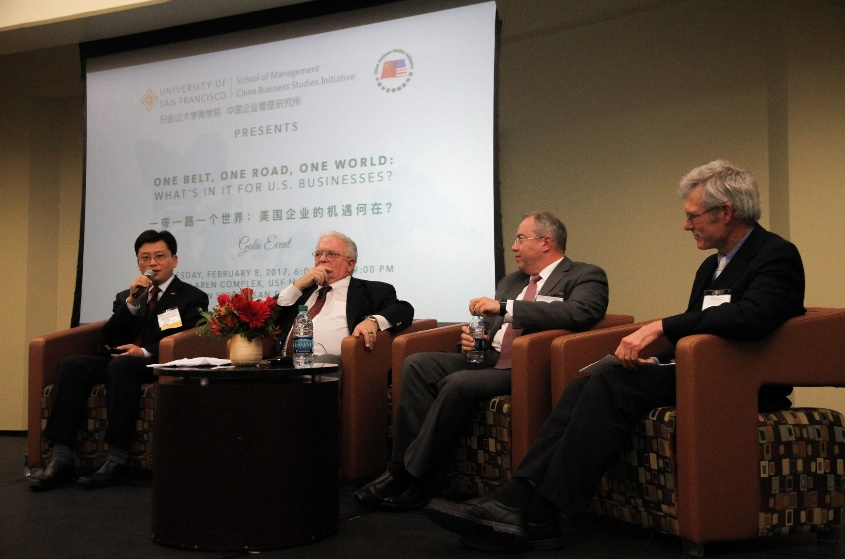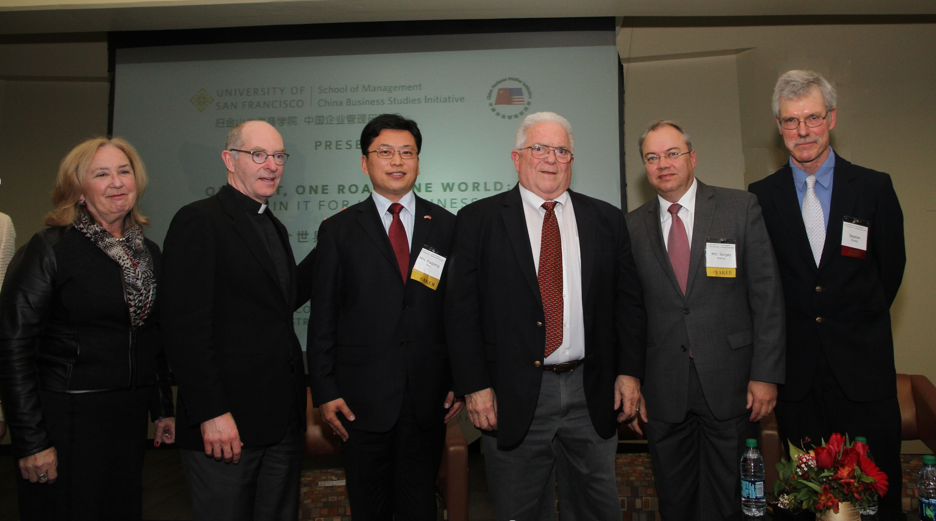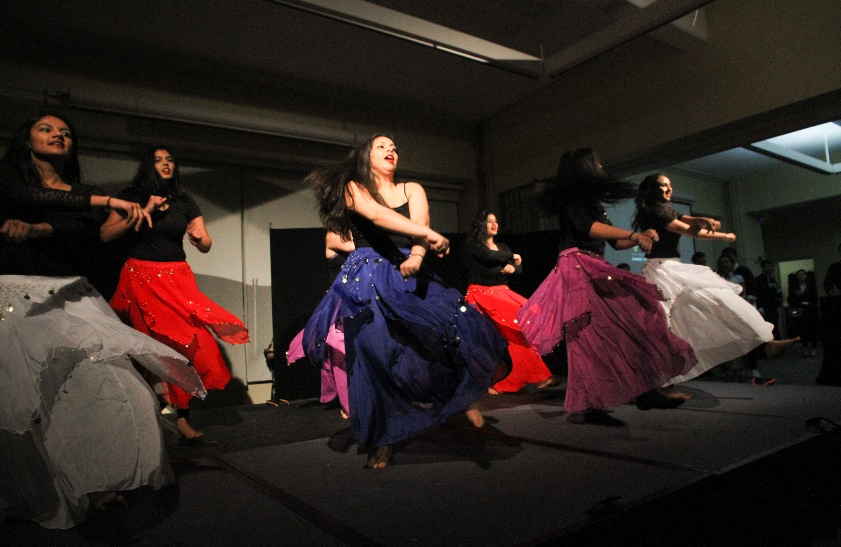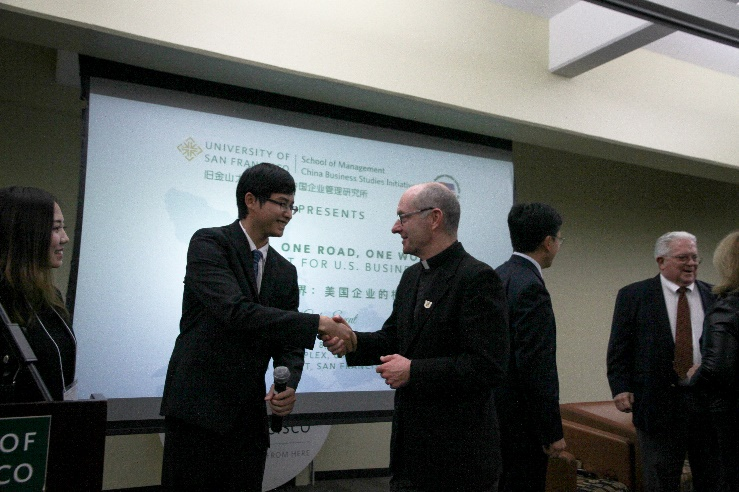
From left to right: Honorable Faqiang Ren, Chas Freeman, Honorable Sergey Petrov, and Stephen Roddy (Moderator) discussing their views
On February 8th, 2017, University of San Francisco’s China Business Studies Initiative hosted the second One Belt One Road Gala featuring Honorable Chas W. Freeman Jr., the former Ambassador to Saudi Arabia, a former U.S. Assistant Secretary of Defense, an author, and a scholar; Honorable Consul General Sergey V. Petrov of Russian Federation, and Honorable Deputy Consul General Faqiang Ren of the People’s Republic of China. This three-part event was part of the effort to raise funds for CBSI’s newest program–Student Ambassador Program– in which 30 students will be a part of the upcoming academic-industry hybrid conference to be held this May in Langfang, China. The students will have the opportunity to partake in the keynote speeches, panel discussions, roundtables and apply their knowledge through participating in B2B activities, networking events, business negotiations, amongst many more.

Attendees listening to the panel discussion
USF President, Paul Fitzgerald as well as School of Management Dean, Elizabeth Davis offered their welcome to the attendees. Chas Freeman opened the discussion by talking about the potential business partnerships with China’s One Belt One Road Initiative, an ambitious foreign economic development and infrastructure project. This initiative would create two extensive trade routes, one along the ancient Silk Road and another by sea that links China with more than 60 countries in Asia, Europe and Africa. In his keynote presentation, he mentioned, “at least 890 projects for new roads, 50,000 miles of high speed railways, perhaps pipeline supports, airports, and telecommunications links has boosted the efficiency of overland travel economic transactions across Eurasia.” The growing number of projects provide an opportunity for US businesses to take part before the many Asian and the Europeans join in on the competition. Further analysis was held through a trialogue with two representatives from the OBOR countries, Honorable Sergey Petrov and Honorable Faqiang Ren. Their conversation revolved around views and the policies that will affect the US and Eurasia, and suggestions for private sectors who will potentially participate in the One Belt One Road Initiative. Honorable Petrov pointed out that the Eurasian Economic Union, which began operating in 2015, “has established relationships with more than 40 countries in the world. Within, they will be showing the union’s side on the free trade agreements. We [Russia] definitely have very good connection, very good exchanges, especially with Chinese friends, to discuss about how we can align the union with One Belt One Road.” Although this growing union is still young and is still developing, it is created to bring back the advantages of economic cooperation that once existed in the Soviet Union. There is potential in joining forces with other nations to improve the One Belt One Road Initiative, as Honorable Ren mentioned about his visit to Sri Lanka building the #23 airport expressway, “we saw some investment and equipment provided by Australia, and consultation by Japan. We’re in an interdependent world.” OBOR is not created just for China, but an opening for collaboration among other countries. USF President, Paul Fitzgerald as well as School of Management Dean, Elizabeth Davis offered their welcome to the attendees. Chas Freeman opened the discussion by talking about the potential business partnerships with China’s One Belt One Road Initiative, an ambitious foreign economic development and infrastructure project. This initiative would create two extensive trade routes, one along the ancient Silk Road and another by sea that links China with more than 60 countries in Asia, Europe and Africa. In his keynote presentation, he mentioned, “at least 890 projects for new roads, 50,000 miles of high speed railways, perhaps pipeline supports, airports, and telecommunications links has boosted the efficiency of overland travel economic transactions across Eurasia.” The growing number of projects provide an opportunity for US businesses to take part before the many Asian and the Europeans join in on the competition. Further analysis was held through a trialogue with two representatives from the OBOR countries, Honorable Sergey Petrov and Honorable Faqiang Ren. Their conversation revolved around views and the policies that will affect the US and Eurasia, and suggestions for private sectors who will potentially participate in the One Belt One Road Initiative. Honorable Petrov pointed out that the Eurasian Economic Union, which began operating in 2015, “has established relationships with more than 40 countries in the world. Within, they will be showing the union’s side on the free trade agreements. We [Russia] definitely have very good connection, very good exchanges, especially with Chinese friends, to discuss about how we can align the union with One Belt One Road.” Although this growing union is still young and is still developing, it is created to bring back the advantages of economic cooperation that once existed in the Soviet Union. There is potential in joining forces with other nations to improve the One Belt One Road Initiative, as Honorable Ren mentioned about his visit to Sri Lanka building the #23 airport expressway, “we saw some investment and equipment provided by Australia, and consultation by Japan. We’re in an interdependent world.” OBOR is From left to right Dean Davis, President Fitzgerald, Honorable Faqiang Ren, Chaz Freeman, Honorable Sergey Petrov, and Stephen Roddy not created just for China, but an opening for collaboration among other countries. ![endif]–

From left to right Dean Davis, President Fitzgerald, Honorable Faqiang Ren, Chaz Freeman, Honorable Sergey Petrov, and Stephen Roddy
The Student Ambassador Program presented cultural performances and cultural exhibitions that represent those countries along the One Belt One Road Initiative. Further conversations continued at the networking reception where the business executives, scholars, students, as well as the speakers followed up on the OBOR discussion, connected with student ambassadors, and discussed about the upcoming international conference. This gala would not have been made possible without our generous sponsors: Hebei Chamber of Commerce in California USA, Deloitte, Hong Kong Trade Development Office, Professor Marshall Meyer, UpHonest Capital, Youmyou, and Kingdom of Dumpling. The reception included wine generously donated by PARVINO, Proposal Napa Valley, and iWinery beverages.

From left to right: Cinthia Segovia-Sosa, Abigail Panganiban, Samerial Johns, and Julia Aziz are
part of the 30 students in Student Ambassador Program attending the gala.

One of the cultural performances at the gala event, the Bollywood dance,
generated the excitement in the crowd

President Fitzgerald talking to two of the Student Ambassador Board members:
Elena Pan and Stephen Chen

Students showcasing traditional Chinese culture through a Qipao dance performance

Nikolaus Jacobs and Anna Wu entertaining the guests as the Masters of Ceremony

Student Ambassadors with President Paul Fitzgerald, Dean Elizabeth Davis,
CBSI Director Xiaohua Yang, and the faculty advisors, Steve Roddy, Sara Ding and Susan Stryker
Click HERE to view the video of the event.